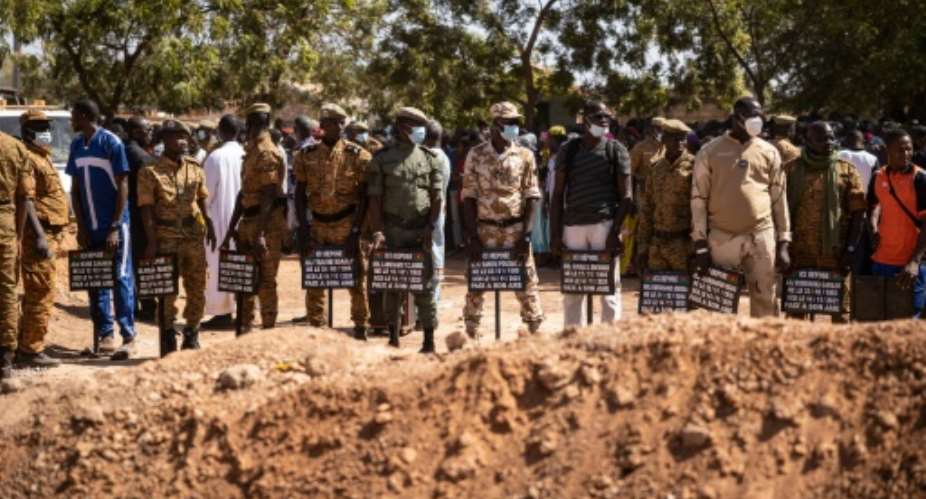Burkina Faso has unveiled a new tactic in its fight against a bloody jihadist insurgency -- "dialogue" between community leaders and local fighters who have fallen into extremism.
The initiative, announced earlier this month by the junta that seized power in January, marks a shift from security-centered efforts to end the country's long-running conflict.
Over the past six years, more than 2,000 people have died, many of them members of the security forces, and at least 1.8 million people have fled their homes.
Under an olive-branch scheme, "local dialogue committees" are bringing community leaders and local jihadists together for talks.
There is a strict condition to the initiative -- there is a bar on men deemed to have ties to Al-Qaeda or the so-called Islamic State (IS), the two groups that initiated the insurgency.
The scheme stems from the realisation that most of the jihadists in Burkina today are not members of the two big transnational groups, said Francois Zoungrana, an anti-jihadist commander in the gendarmerie.
"Currently, the enemy mainly comprises Burkinabe citizens... who are very often invisible and mixed into the population," he said.
Home-grown
Around 10 "endogenous" jihadist groups have developed in Burkina Faso over the past six years that do not have have visible ties to Al-Qaeda or the IS, according to Burkinabe intelligence.
These groups are "a kind of metastasis of the terrorist phenomenon," said Drissa Traore, a professor and political analysis.
Their presence "means the authorities have to explore other options instead of the military-only one."
Sahel security experts often say that many jihadist recruits are lost or unemployed young men, who are lured by the promise of money and a mission.
The minister for national reconciliation, Yero Boly, said the dialogue was conceived after young fighters had asked for talks with traditional, religious and tribal leaders.
 Burkina Faso. By (AFP)
Burkina Faso. By (AFP)
"The path they have taken is a path with no future, that's what young fighters have been saying," Boly said.
"They have weapons and are in armed groups which attack their own villages."
As a result, "dialogue became established and is following its course," he said.
He stressed that important red lines remain in place.
The state still rules out "directly dialoguing with terrorist leaders, and negotiating with them even more so" and the army "is continuing its work" in anti-jihadist operations, he said.
Caution
The scale of the talks are unclear but a security source said "contacts" are already underway between fighters and community leaders in the violence-torn north and east.
On April 20, say local inhabitants, combatants lifted a two-month old blockade on Djibo, capital of the northern province of Soum, allowing an army convoy of a hundred trucks of food and various goods to reached the city.
 Displaced: 74-year-old farmer Belem Boureima and his family. By ISSOUF SANOGO (AFP)
Displaced: 74-year-old farmer Belem Boureima and his family. By ISSOUF SANOGO (AFP)
Traore and others sounded a note of caution about the hazy scope of the talks at this stage -- and whether the initative had a future.
Those engaging in the dialogue are only a "small minority" of active jihadists, said Traore.
"How many of these young people want to put down their arms?" he asked. "And are they speaking in their own name or for armed groups?"
Moussa Diallo, member of a team coordinating youth in the Sahel, also pointed to the stumbling block about young fighters who were desperate to return to a normal life.
"Everyone asks how you can live alongside people who have killed your parents and then stolen all your possessions," he observed.
He also recalled that there had already been "informal dialogues led by local communities" in the past.
These initiatives resulted only in "a brief lull," which ended when commitments were not followed through, Diallo said.
"In the end, these people take up arms again and become even more violent,' he said.





 This IMANI job no dey pap; the people you are fighting for are always fighting y...
This IMANI job no dey pap; the people you are fighting for are always fighting y...
 Prof. Naana Opoku-Agyemang has changed; you can see a certain sense of urgency –...
Prof. Naana Opoku-Agyemang has changed; you can see a certain sense of urgency –...
 MFWA Executive Director slams Akoma FM for engaging in ‘irresponsible’ media pra...
MFWA Executive Director slams Akoma FM for engaging in ‘irresponsible’ media pra...
 ‘Women must become millionaires too’ — Prof Jane Naana on establishment of Women...
‘Women must become millionaires too’ — Prof Jane Naana on establishment of Women...
 Some believe only in Ghanaian votes, not Ghana — Kofi Asare jabs politicians
Some believe only in Ghanaian votes, not Ghana — Kofi Asare jabs politicians
 Plan to make BEST sole aggregator of Sentuo Oil Refinery will create market chal...
Plan to make BEST sole aggregator of Sentuo Oil Refinery will create market chal...
 2024 elections: I can't have the man I removed from office as my successor — Aku...
2024 elections: I can't have the man I removed from office as my successor — Aku...
 2024 Elections: Immediate-past NPP Germany Branch Chairman garners massive votes...
2024 Elections: Immediate-past NPP Germany Branch Chairman garners massive votes...
 Gov’t focused on making Ghana energy self-sufficient, eco-friendly – Akufo-Addo
Gov’t focused on making Ghana energy self-sufficient, eco-friendly – Akufo-Addo
 April 25: Cedi sells at GHS13.74 to $1, GHS13.14 on BoG interbank
April 25: Cedi sells at GHS13.74 to $1, GHS13.14 on BoG interbank
